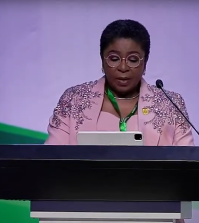Treasuries & transformation: finance departments’ key roles in digital

In many governments, finance departments view technology as a useful efficiency tool. But at the 2019 Global Government Finance Summit, delegates heard that successful digital transformation demands that finance leaders actively support the agenda – rebuilding spending approval and governance processes to suit digital technologies’ unique characteristics. Matt Ross reports
“It’s vital that finance ministries get in front of the digital agenda – both by leading by example, and by supporting the agenda,” said Arnauld Bertrand. “They need to push reforms, to allow funding allocations, and to communicate.”
Bertrand, EY’s Global Government & Public Sector Advisory Leader, was setting out the key building blocks for effective digital transformation in government. Skills form another essential foundation, he pointed out – and “digital transformation very rarely happens with the same people: you need to bring in new skills and people, and to upskill your existing staff.”
Speaking at the Global Government Finance Summit – which brings together senior leaders from finance ministries, and was hosted this year in Paris by France’s Ministry of Economy and Finance – Bertrand also argued for the creation of a strong central unit and a clear, government-wide strategy to drive progress.
Governments need a “central agency to coordinate; to get the right funding and challenge in place; to identify best practice and replicate it at scale; to push and review transformation”, he said. “If you don’t have strong political leadership from accountable politicians and an administration to lead the way, little will happen.”
Greg Orencsak, Deputy Minister of Finance in Canada’s provincial Government of Ontario, was sympathetic – highlighting the value of giving central digital units the power to “update technology policies, in terms of how governments build and procure technology.” They can also set and police standards on matters such as user experience, he added.
Why finance departments matter to digital

But digital units can’t achieve all of their goals without heavyweight support – including from the finance departments that shape project appraisal and spending decisions. For best practice in digital transformation involves experimentation and iterative development, progressing towards a final system that can’t be closely defined at the project’s outset; yet many government’s spending approval systems demand business plans detailing exactly how the end product will operate. And while the strengths of digital applications often lie in building services around users, cutting across departmental responsibilities and legacy systems, traditional approaches to governance and accountability run down vertical, organisational lines.
“Government is currently organised around processes and approvals and programmes, but not around customers – so the customer is a very important unifying force in terms of putting people first,” noted Orencsak. “When it comes to digital and changing the culture of government, one important thing to get right is the policy and legislative enablement of digitisation. Our piping in government isn’t necessarily set up for digital delivery in terms of legislative accountabilities, so removing those impediments and modernising some of the laws is a very important foundation.”
Why digital matters to finance departments

Where governments can provide a good environment for digital transformation, finance ministries can benefit as much as delivery departments. Carlos Martínez Mongay, Deputy Director General in the EU’s Directorate General for Economic and Financial Affairs, pointed to the value of using government data to assess the impact of government spending – supporting performance-based budgeting, service design, and improved allocation of public funds. “Big data offers the possibility, from the point of view of policymaking, to assess and anticipate the impact of certain interventions and programmes,” he commented. “This would allow us to enhance efficiency: to do more with our money, or the same with a bit less.”
However, as other delegates pointed out, the value of a strong central unit is diluted in federal and decentralised nations – where many services are delivered by regional or local bodies with their own democratic mandates. Miguel Castro Coelho, Chief Economist at Portugal’s Office of the Finance Minister, argued that Portugal’s own digital agenda – “a very active programme that aims not only to cut red tape and eliminate bureaucratic inefficiencies, but also to move services to electronic platforms” – is “happening at the decentralised level, with people working to improve the efficiency of their services. As they realise there are new technologies and services available, they adopt them.”
“My question is: is there genuine value in setting up a body and setting out your overall vision and strategy for the adoption of digital technology across government, or could you do this in a decentralised format?” he asked.

For Coelho, the primary barriers to digital transformation lie in the realm of politics and presentation, not systems and capabilities. “Most of the obstacles that get in the way of making improvements are of a political economy nature, to do with public and electoral perceptions,” he said. “I see plenty of room for further efficiency improvements with very substantial implications. Political economy problems are the ones that typically really constrain your ability to make these reforms.”
If such challenges can be overcome, digital transformation offers big opportunities for finance ministries – both by improving their own capabilities, and through improving efficiency and effectiveness across the public sector. But to realise these benefits, government finance leaders and departments will have to reform their own systems and cultures just as thoroughly as their peers in delivery departments.
Next steps
Central digital units need their support to influence digital processes and programmes across government. Systems of financial approval and oversight must be reformed to fit the requirements of digital technologies. And to better understand the impact of public spending – and thus improve budgeting decisions – they’ll need the capabilities and determination to build their own digital systems.
Drawing on his own experience, Orencsak provided a couple of pointers for his peers overseas. “You can’t do everything at once, so pick your spots,” he said. “We’ve focused on high-impact, high-value transactions that are meaningful to people. That’s helpful in terms of user experience, and it also helps you to prioritise how and at what pace you organise technology platforms, data sharing and the like – enabling a different approach.”
Time is short, concluded Bertrand – for civil servants everywhere are under pressure, and can’t afford to forego the potential benefits of digital technology. “Governments are facing globalisation, demographic change, geopolitical and environmental challenges, and budgetary pressures that are changing the environment for the public sector. In this context, government must find new ways to finance and deliver public services,” he said.
“Digital transformation could deliver the missing link, enabling government to deliver better outcomes for citizens in a more sustainable way. And the cost of doing nothing is huge – for people, societies, and public finances.”
This is the third part of our report on the Global Government Finance Summit – hosted during June in Paris by France’s Ministry of Economy and Finance, and supported by knowledge partners EY and Swiss Re. The first part covered the presentation on the global economic outlook, and the challenges around rising inequality. The second part explored how governments can better track the impact of spending, and use that data to improve policies and services. The fourth part focused on the challenge of weak productivity growth, examining its causes, consequences and cures. And the fifth part covered the need to take preventative action to protect people and public finances from environmental, social and economic disturbance.
Global Government Finance Summit 2019 attendees
In alphabetical order by surname
Facilitator:
- Andrew Kakabadse, Professor of Governance and Leadership, Henley Business School
Civil servants:
- Torsten Arnswald, Head of Fiscal Policy Division, Federal Ministry of Finance, Berlin, Germany
- Noureddine Bensouda, Treasurer General of the Kingdom, Ministry of Finance, Morocco
- Rosa Aldea Busquets, Deputy Director General in DG Budget, and Accounting Officer, European Commission
- Édouard Chrétien, Head of Domestic Economic Policy Unit, French Treasury, France
- Miguel Castro Coelho, Chief Economist, Office of the Minister of Finance, Ministry of Finance, Portugal
- Michel Houdebine, Chief Economist, French Treasury, France
- Carlos Martinez Mongay, Deputy Director General, DG ECFIN (Economic and Financial Affairs), European Commission
- Han Neng Hsiu, Deputy Secretary (Development), Ministry of Finance, Singapore
- Greg Orencsak, Deputy Minister , Ministry of Finance, Canada
- Veiko Tali, Secretary General, Ministry of Finance, Estonia
- Vladimir Tsibanov, Head of Fiscal Policy Department, Ministry of Finance, Russia
- Robert Woods, Director, International Group, HM Treasury, United Kingdom
Knowledge partners:
- Esther Baur, Head of Europe Director, Public Sector Solutions, Swiss Re
- Arnauld A. Bertrand, EY Global Government & Public Sector Advisory Leader, EY
- Alessandro Cenderello, EY Global Client Service Partner for the EU Institutions, EY
- Philippe Rambal, EY France Government & Public Sector Leader, EY
- Veronica Scotti, Group Managing Director, Chairperson Public Sector Solutions, Swiss Re
Global Government Forum:
- Matt Ross, Editorial Director, Global Government Forum
- Kevin Sorkin, Chief Executive, Global Government Forum
- Sue Torka, Director, Global Government Forum























